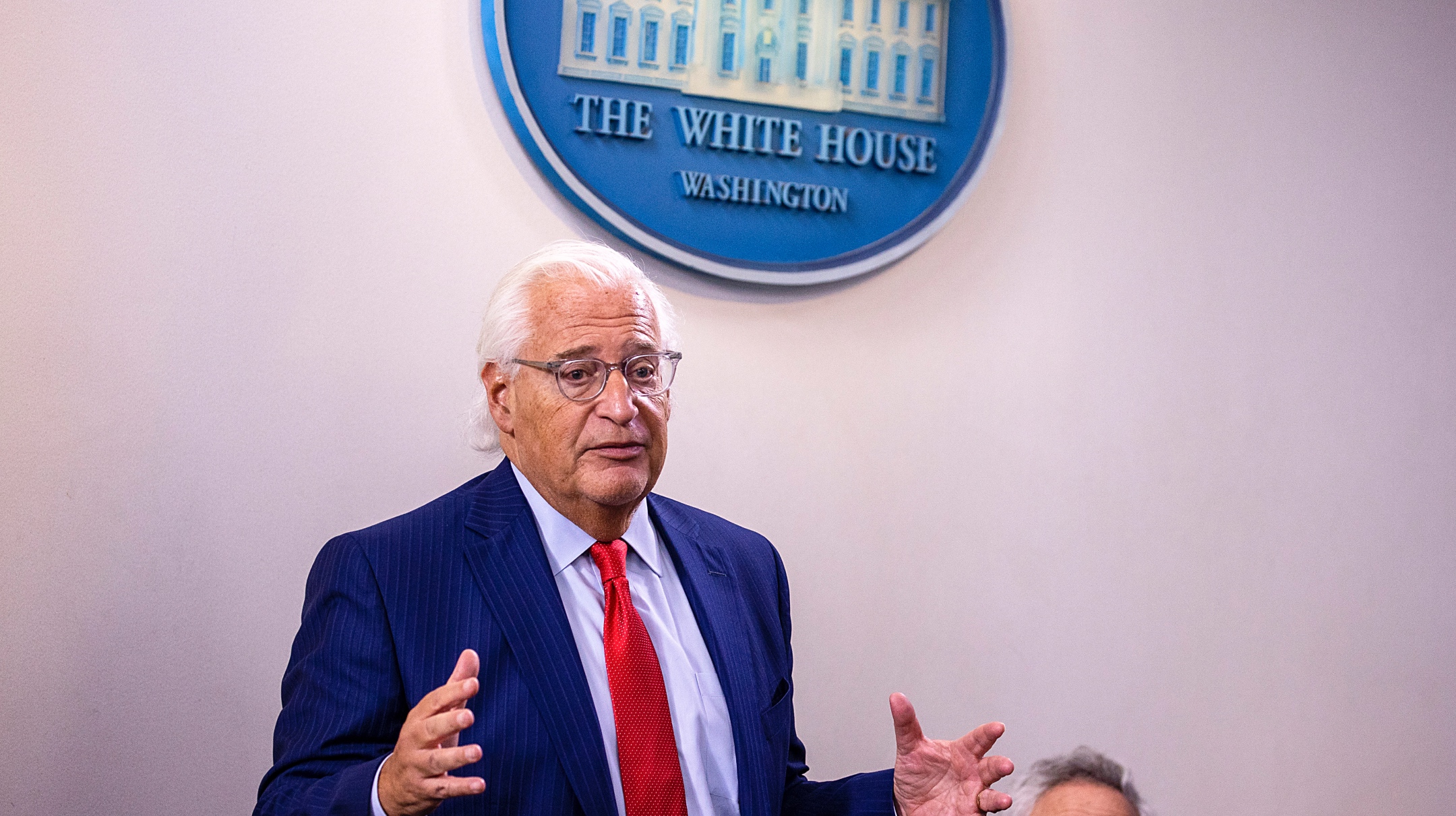Trump’s ambassador to Israel criticizes its government’s plans for judicial reform
‘You compare this to the U.S., but it doesn’t work like that in our system,’ Friedman told a key architect of the Netanyahu government’s planned judicial reforms

David Friedman, US Ambassador to Israel speaks during a briefing at the White House August 13, 2020. (Tasos Katopodis/Getty Images)
(JTA) — When David Friedman served as ambassador to Israel under former President Donald Trump, he was known for helping to shepherd through policies favored by Prime Minister Benjamin Netanyahu.
That’s why it’s remarkable that he vocally criticized one of Netanyahu’s signature policy goals: the controversial proposal to overhaul Israel’s judiciary.
While attending a session of a conservative political conference last week in Israel, Friedman told Israeli lawmaker Simcha Rothman, an architect of the judicial reform, that the legislation “was going too far for me and for many Americans” according to attendees who spoke to Axios.
Rothman, a member of the far-right Religious Zionism party who chairs the Knesset Constitution, Law and Justice Committee, said the reform would make Israel’s courts resemble the U.S. legal system. Friedman countered that that comparison is off-base because an element of the reform, which would allow a majority of parliament to override the court’s authority, could threaten minority rights.
“You compare this to the U.S., but it doesn’t work like that in our system,” Friedman said, according to Axios. The conference was sponsored by the Tikvah Fund and the Hertog Foundation, conservative U.S. Jewish groups that back many of Netanyahu’s policies. Netanyahu has sought American support, particularly among conservatives, for his judicial reforms.
Israel’s Supreme Court has issued rulings protecting the rights of minorities, including Arab citizens of Israel, non-Orthodox Jewish denominations, and LGBTQ people. The U.S. Supreme Court also has struck down laws passed in Congress, citing the U.S. Constitution. Israel lacks a constitution, so its Supreme Court cites a set of foundational acts called basic laws, which function as a quasi-constitution. It also cites common law, the country’s Declaration of Independence, Jewish law and other sources in coming to its decisions.
Friedman did not respond to a request for comment via Twitter direct message.
Friedman, who was Donald Trump’s bankruptcy lawyer and his ambassador to Israel throughout his presidency, forged a close alliance with Netanyahu, helping to see through radical changes in U.S. Israel policy long sought by the Israeli right, including moving the U.S. embassy to Jerusalem, withdrawing the U.S. from the Iran nuclear deal and recognizing Israeli sovereignty over the Golan Heights.
A longtime philanthropic backer of Israeli West Bank settlements, Friedman reportedly worked with Netanyahu to use a peace proposal advanced by Jared Kushner, Trump’s son-in-law and top Middle East adviser, as a pretext to annex parts of the West Bank. Kushner opposed Friedman’s initiative and eventually nixed the plan. (That account was revealed in a book by Kushner. Friedman has denied it.)
Friedman’s closeness to Trump and to Netanyahu is a source of pride for him, and he cites both men as friends on the speaking circuit. But this is not the first time he has broken with them on a matter of principle: Last year he earned Trump’s ire by criticizing the former president for meeting with two antisemites, the rapper Kanye West and Holocaust denier Nick Fuentes.
Friedman told Rothman he was in favor of some parts of the judicial reform. Like many American Jewish public figures, he has endorsed Israeli President Isaac Herzog’s calls for compromise between the Knesset’s governing coalition and opposition.
Opposition leaders say they are ready to negotiation as long as Netanyahu stops advancing the court reform legislation. The reforms have sparked a major political crisis in Israel, bringing hundreds of thousands of people into the streets for weekly protests. On Wednesday evening, a group of Israeli lawmakers from the coalition and opposition jointly endorsed compromise negotiations.
This article originally appeared on JTA.org.
A message from our CEO & publisher Rachel Fishman Feddersen
I hope you appreciated this article. Before you go, I’d like to ask you to please support the Forward’s award-winning, nonprofit journalism during this critical time.
We’ve set a goal to raise $260,000 by December 31. That’s an ambitious goal, but one that will give us the resources we need to invest in the high quality news, opinion, analysis and cultural coverage that isn’t available anywhere else.
If you feel inspired to make an impact, now is the time to give something back. Join us as a member at your most generous level.
— Rachel Fishman Feddersen, Publisher and CEO